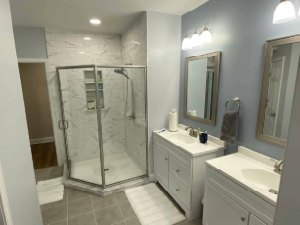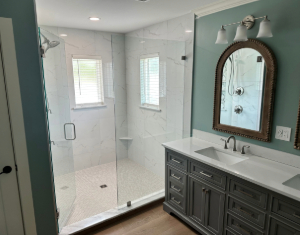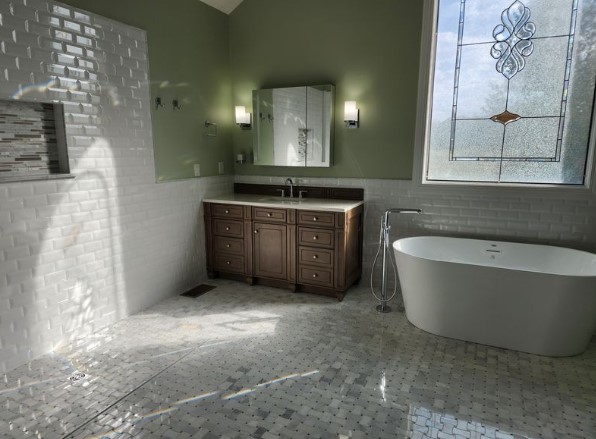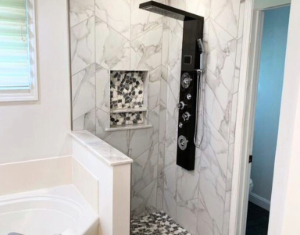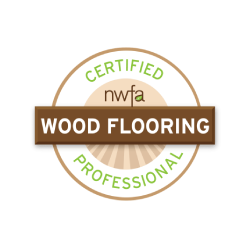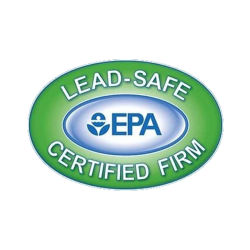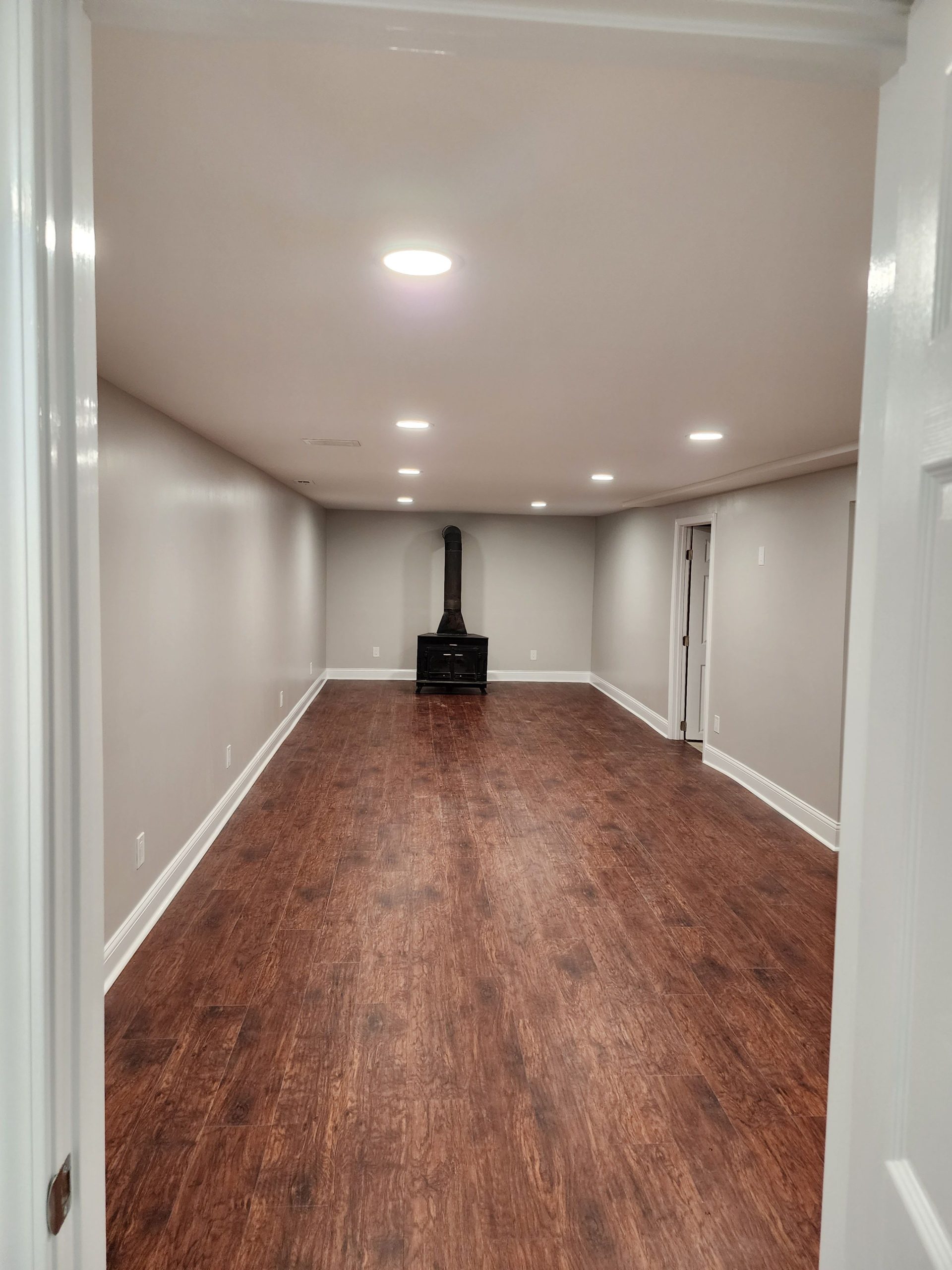The flooring for your basement should be waterproof. While you can get away with moisture resistant flooring, such as laminate, you absolutely must have a basement waterproofing system beforehand. Without one of these systems in place, the next time there is a torrential downpour, everything in your newly finished basement could get flooded and ruined. The good news is that there are plenty of waterproof, and moisture resistant flooring options for every homeowner.
Before We Start
If you are planning to finish your basement, first you have to fix the existing concrete. Does your basement leak when it rains heavily? You’ll need a waterproofing system installed before you finish it. Cracks must be sealed properly. Is the concrete uneven in places? The floor will have to be leveled before you can even consider installing flooring. Your bare bones basement must be turned into tip top shape before you can work on finishing it.
What is the Best Flooring for a Basement Overall?
Luxury Vinyl Tiles or Planks. Luxury vinyl tile gives the same look and feel of tile, but at a much lower cost, and it is still waterproof. These don’t have the durability of ceramic tile, but they are much easier to remove and replace when the time comes. Most importantly, vinyl is waterproof, and will be safe in the moist environment of your basement. It will also survive basement flooding.
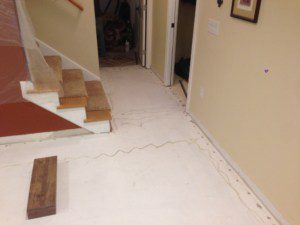
Basement-Flooring-Remodel
Tile is a close second. Ceramic tile is affordable, it is extremely durable, and even if your basement does flood, you will not have to replace your tile. However, you don’t have to limit yourself to making your basement floor match your bathroom. There are large format tiles, tile planks that replicate hardwood flooring, octagonal tiles, mosaic, subway tiles, slate, granite, marble, this list goes on forever. In addition, there are countless patterns and colors to choose from to create a truly unique floor in your finished basement. The drawback to installing tile in the basement is that it makes for a cold floor, and it is more difficult to remove when new flooring is needed. But that won’t be for many years.
More often than not, when we finish basements for homeowners, they opt for Luxury Vinyl Tile or Luxury Vinyl Planks in most areas, but elect to install ceramic tile flooring in kitchen and bathroom areas. Vinyl should be installed on top of an underlayment, but tile can be directly attached to the concrete. Neither of these options require the cost of a subfloor.
Best Basement Flooring on a Budget?
Vinyl is still the best option for building a finished basement on a budget. Peel and stick vinyl planks or tiles are ideal for a handy homeowner putting a DIY finish on their basement with a tight budget. Click-lock luxury vinyl planks that create a floating floor are also great for a DIY basement flooring project. If you can read a tape measure, and have the means to cut the planks to length, you can install the flooring in the basement you are finishing. Once again, this is a great budget option because installing a waterproof subfloor is not required.
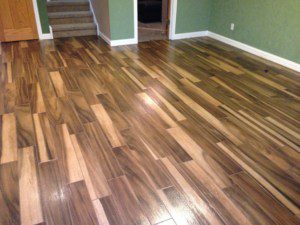
Tile-Plank-Basement-Floor
What About Hardwood in the Basement?
Hardwood flooring is a no go in the basement zone. Even with a waterproofing system, the air stays moist when you’re underground, and the moisture leeches through the concrete. Installing hardwood in your basement will look gorgeous, but at some point, boards will warp, cup, and twist. When you pull them up to repair the floor, there will most likely be mold beneath them.
However, you can still get the look and feel of hardwood with wood-like tile planks, or luxury vinyl planks that look like the real thing. You can install laminate flooring in the basement, but it has to be waterproof laminate. Most laminate is moisture resistant, but still susceptible to water damage. Also, there are waterproof brands of engineered wood flooring available. So you can get the variance of real wood grain without the risk of installing hardwood in a moisture prone area. However, if you absolutely must have the look of hardwood, we recommend wood-like tile planks.
Laminate and engineered wood flooring will require the installation of a special subfloor that is waterproof and mold resistant.
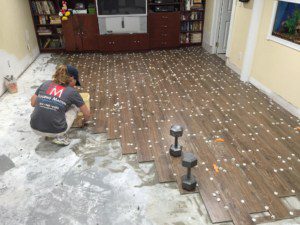
basement-tile-construction
What Other Options are There?
Many homeowners finish their basements with rubber flooring, put a nice finish on the existing concrete floor, put down polished epoxy, or paint the concrete with a sealing paint. Vinyl sheets are another very low cost and easy to DIY basement flooring option, but this vinyl is not built to last like planks and tiles. These minimalist options are all great, however, they aren’t the most comfortable. Walking on concrete, epoxy, paint, or rubber, is cold. Especially if you are trying to relax at home with your shoes off. If you’re just turning your basement into a home gym, these are fine options, but if you are building a bar, office, or home theater, your floors will need a more finished look, and a more comfortable feel.
What About Carpet?
Don’t. Even with shampooing, you can never truly get carpet clean. In addition, if there is a moisture problem in your basement, the particles in your carpet along with that moisture are the perfect place for mold to grow. Although you can install carpet in your finished basement, we advise against it. In the case of a flood, it is very difficult to dry installed carpet, and that’s a perfect scenario for a mold infestation.
If you’re looking to finish your basement flooring in New Albany, Indiana, don’t hesitate to call us here at Flooring Masters & Professional Remodelers. We provide our customers with lifetime relationships, and take great care in our work. We also provide the best options for perfect floors and other renovations. Schedule a free estimate today!

